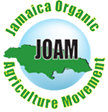IMPORTANCE OF CERTIFICATION
A farm must be certified for its pre-packaged produce to be branded organic.
An increasing number of persons are calling themselves organic producers and labelling their produce as organic. The National Standards provide the minimum production and processing practices which should be followed for produce in Jamaica to be labelled organic. Third party certification where an independent agency verifies that the practices used follow the standards of the relevant country is one way to minimize false organic claims. The standards and certification protect the consumer.
Certification guarantees that an organic product has been produced and processed according to the guidelines outlined in organic standards. Standards vary therefore the producer has to ensure that the requirements of the market where the produce are to be sold are met.
UPHOLDING STANDARDS & ENSURING CERTIFICATION
JOAM, through international funding by CIDA, CPEC, JEA, has made strides in developing organic standards and certification in Jamaica and the Caribbean region.
In 2003, approximately fourteen (14) Jamaicans were successfully trained to international standards as organic inspectors. Within the same year JOAM Organic Standards, ( the only local private standard) was developed along with The Jamaica Organic Farming Handbook, A Guide for Extension Workers and Farmers.
The European Union through the Centre for the Development of Enterprise (CDE) supported international certification of the first two farms in Jamaica in 2002 and seven others in 2004. Through the PROINVEST programme it supported an assessment of the Caribbean Policy framework and development of a Caribbean organic business plan.
The EU through the FAO funded the organic component of the EC Food Facility project in 2010. This project established 12 organic demonstration sites demonstrating a variety of practices. The project also funded various levels of training for farmers and extension personnel. The trainings concluded with International Organic Inspectors Association (IOIA) basic crop production and livestock trainings. Fifteen persons successfully completed the basic crop production training while nine successfully completed the livestock training. The successful candidates include extension personnel from RADA.
A total of 35 crop production and 9 livestock inspectors have been trained by IOIA to date.
NATIONAL ASSISTANCE
The development in this critical area of the local industry is ongoing and received a boost in 2006 from national funding, through the National Organic Agriculture Enhancement Project (NOAEP). The National Organic Agriculture Steering Committee (NOASC) was established under the NOEAP to facilitate the enhanced development of a sustainable organic agriculture (OA) sector in Jamaica.
The objectives of the project, in regards to the organic agricultural industry in Jamaica were to:
- Develop a policy document and supporting legislation for the local OA sector
- Hold sensitization and training workshops in the principles and techniques of OA
- Prepare and disseminate information relevant to OA
- Facilitate international and local organic certification
- Edit and reformat the JOAM handbook
JOAM partnered with the Bureau of Standards, Jamaica to develop the CARICOM Code of Practice for Organic Production and Processing. This was adopted as the National Standard and launched on June 22, 2016. The official function was held at Woodford Market Garden, a JOAM farm member and certified organic farm.
